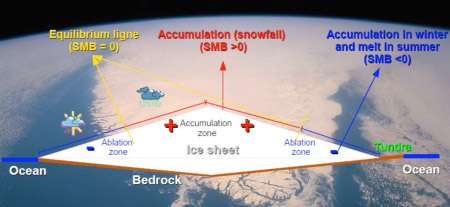Good news? Greenland is melting, but less quickly than predicted

The melting of the Greenland ice sheet is speeding up and 2012 already seems to be a record year in terms of this thawing. The potential consequences of this melt on the climate and on the rise of sea levels are such that the island of Greenland and its ice sheet have been the subject of close monitoring by researchers for a number of years. One of them, Xavier Fettweis, a climatology researcher at the University of Liège, has developed a mathematical model which studies different possible scenarios. Whilst this model confirms the acceleration of the thawing, it does not yet take into consideration a factor which has just been revealed in the journal Nature by American researchers working in part on the basis of venturing beyond the model designed by Xavier Fettweis.
In this publication, the American researchers (from the Universities of Colorado, Wyoming and Montana) stress the importance of what is called a 'percolation zone': the meltwater does not immediately join the oceans but infiltrates the empty spaces of the snowpack, then stays there and refreezes in the Winter. This phenomenon does not contradict the predictions of Xavier Fettweis' models but put backs their coming into reality by some ten years or so at most. During this lapse of time Greenland's contribution to the rise of sea levels is, at least in part, compensated by the storing of water in the island's snowpack.
'In my model,' explains Xavier Fettweis, 'I consider that if the quantity of liquid water present in the snowpack is higher than 70%, the meltwater flows into the ocean. Yet the Americans have demonstrated that certain zones of the ice sheet have much higher storage capacities.'
Whilst many doubts remain, it is nevertheless certain that the Greenland ice sheet contributes significantly to the rise of sea levels. 'All these effects contribute to it,' continues Xavier Fettweis. 'In melting, the ice sheet loses altitude and warms up, which accelerates the thawing. The snow which melts loses some of its whiteness and absorbs more energy, which also leads the melting to spiral.' It all contributes to the melting but it will nevertheless be spread over several centuries, or even over several thousands of years, before we will see the Greenland ice sheet disappear.
2012: a tipping point year?
For 4 million years, the permanence of the Greenland ice sheet has been ensured by snow falls which accumulate in the centre of the island and become transformed into ice. Up until recently the ice sheet mass balance between gains (the falls of snow) and losses (the melting of the ice, icebergs breaking away) in overall mass has been close to zero and the ice sheet was in equilibrium. Despite the constant extension of the melt zone, the ice sheet has stayed in equilibrium thanks to the flow dynamics of the ice, which redistributes the snow mass accumulated in the centre towards the edges of the ice sheet.
Nevertheless the record thaws observed in recent months in 2012 (which have their origins not only in global warming but also modifications in Summer atmospheric circulation) have led to fears that the situation will be reversed. In August 2012 Greenland's surface ice sheet mass balance reached the absolute minimum recorded for at least fifty years. The equilibrium has been shattered, the ice melt and icebergs breaking away exceeding the arrival of snow. The weather conditions in the coming months will thus be decisive for the 2012 ice sheet mass balance, which could prove significantly imbalanced overall for the first time in Greenland's history.
More information: Harper, J., Humphrey, N., Pfeffer, W.T., Brown J. , X. Fettweis, Greenland Ice Sheet Contribution to Sea Level Rise Buffered by Meltwater Storage in Firn, Nature, doi: 10.1038/nature11566, 2012.
Journal information: Nature
Provided by University de Liege











.jpg)





